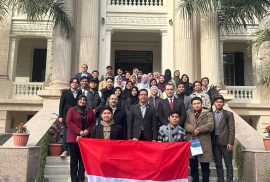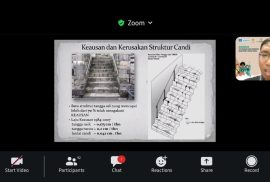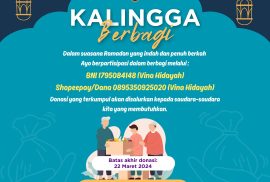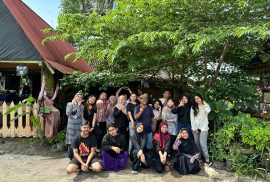Cairo, Tuesday, February 20, 2024 – Muhammad Raushan Afkar, a student of Arabic Literature UGM, successfully completed the 3-month Cairo Credit Transfer Program. Along with 11 colleagues from Universitas Sebelas Maret, Universitas Padjajaran, and Universitas Al-Azhar Indonesia, Afkar joined the study program at the International Center for Arab Studies and Training and Faculty of Letters, Benha University, Egypt. The experience of studying in the land of camels gave him valuable knowledge about the Arabic language and culture which became an important foundation in the development of his studies.
During the program, they were not only taught practical proficiency in Arabic, but were also exposed to the rich culture and history of Arab countries. Students are given in-depth knowledge of the history of Arab civilization and Muslims, as well as the role and contribution of Islamic leaders in creating history.
In every meeting, lecturers actively involve students in listening, analyzing texts, question and answer discussions, and communicating exclusively in Arabic. Students are even encouraged to communicate only in Arabic and will be penalized with a monetary fine if they violate the rules. The money collected is then donated to help the poor people of Egypt. This shows the spirit of solidarity and social responsibility in an academic environment.
In addition, lecturers also enrich the learning experience by bringing typical Egyptian items into the classroom, such as food and cultural artifacts. Thus, students not only gain a comprehensive knowledge of Arabic language and culture, but also acquire a unique and memorable learning experience amidst the richness of Egyptian culture.
At the end of the program, students are given the opportunity to express the knowledge and skills they gained during their journey from Indonesia to Egypt and while living in Egypt through the creation of an Arabic drama with the theme “Journey from Indonesia to Egypt”. Through this drama, students not only show their official Arabic language skills, but also slip some local languages owned by Egypt when interacting and socializing with native Egyptians.
After this program, students are expected to apply what they have learned in Egypt to student life at UGM. They are encouraged to integrate their experiences into their daily activities, both in the use of Arabic language and in the promotion of Arabic culture in the campus environment. Thus, their learning experience does not only stop in Egypt, but also becomes a strong foundation to develop themselves in the future.





